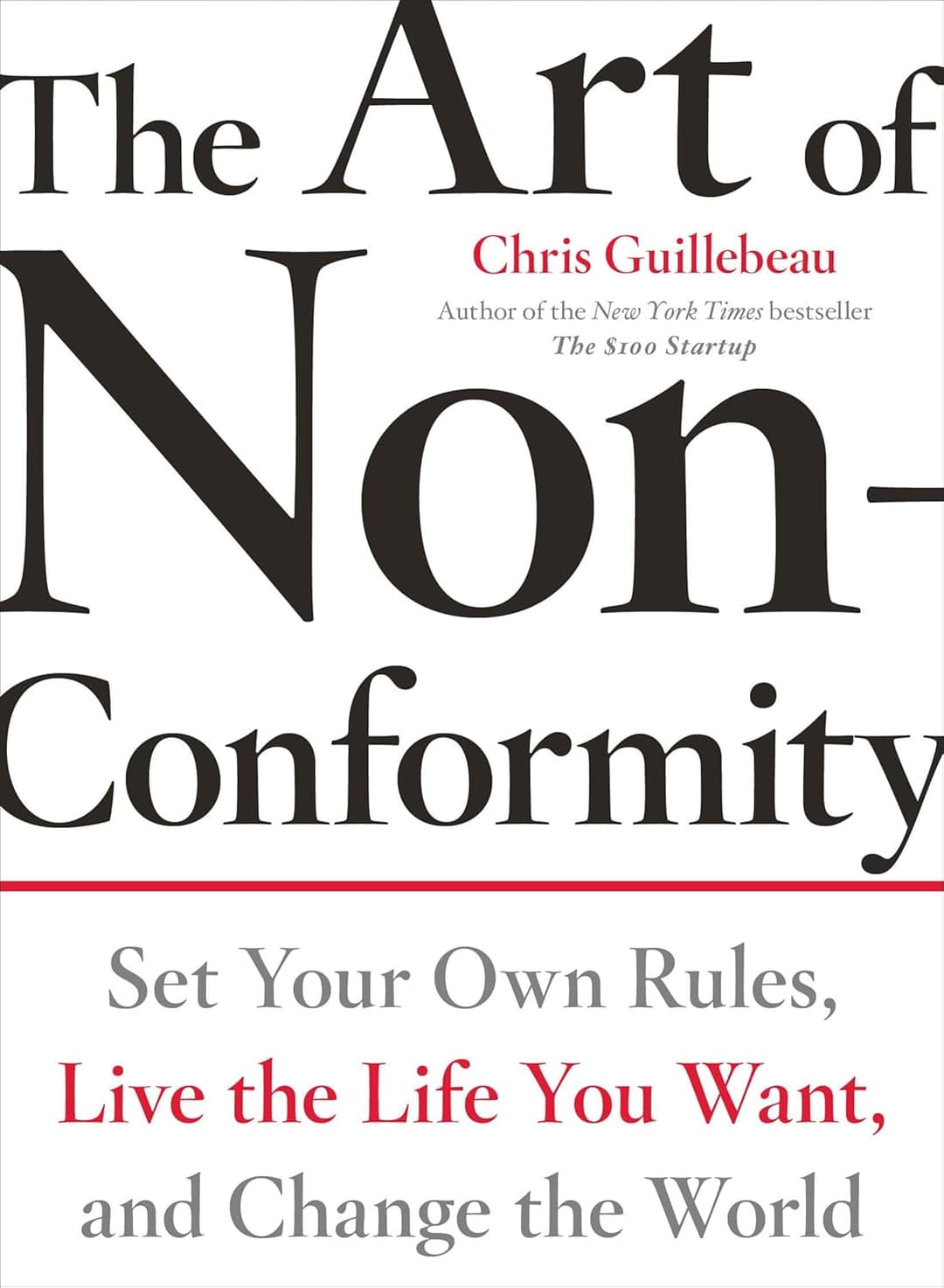
The Art of Non-Conformity
By: Chris Guillebeau
Category: Entrepreneurship
Finished:
Highlights
This is a book about thinking for yourself, a surprisingly difficult task.
“Asking “why?” to everything like a three-year-old is helpful in making sure you don’t jump off the bridge without at least considering the alternatives. Whenever you find yourself confronted by a request, obligation, or expectation you don’t like, it helps to look carefully for the motivations and rationale behind what you hear.”
Part 1: The Remarkable Life
Most of us don’t want to chill on a beach for the rest of our life, we want to work on something meaningful to us.
We need to create some idea of our own “ideal life.” Here are some ways:
- Write out what a perfect day looks like to you in excrutiating detail. Then assess what needs to change to help you get there.
- Create a life goal list, like a bucket list, to give yourself some direction around what you want to accomplish.
A few rules for living an interesting life:
- When you can think in terms of abundance or scarcity, think in terms of abundance
- If you’re unsure about taking a leap of faith, take it
- You can have unlimited dreams and goals but not priorities
Fear
Our biggest obstacles are usually our own fears and insecurities. They are the biggest roadblock to get over.
We’re usually afraid of one of three things when you get down to the roots:
1. Fear of failure
2. Fear of success
3. Fear of change
We typically resist making any change until the pain of making the change is less than the pain of not making the change. To make change, we must make it painful to not make it.
Part 2: Reclaiming Work
The one year, self directed, alternative graduate school (NOTE: I edited the methods since I felt some of Chris’s were ineffective. I also cut a few things):
- Subscribe to the Economist and read what you’re interested in for each issue. Cost: $ 97 + 60 minutes each week.
- Buy a round-the-world plane ticket or use frequent flyer miles to travel to several major world regions, including somewhere in Africa and somewhere in Asia. Cost: variable, but plan on $ 4,000. (Check the “Online Resources” section for more information.)
- Read the basic texts of the major world religions: the Torah, the New Testament, the Koran, and the teachings of Buddha. Visit a church, a mosque, a synagogue, and a temple. Cost: materials can be obtained free online or in the mail (or for less than $ 50) + 20 hours.
- Listen through the complete Michel Thomas tapes for a language. Attend a local language club once a week to practice. Cost: $ 0 + 87 hours.
- Loan money to an entrepreneur through Kiva.org and arrange to visit him or her while you’re abroad on your big trip. Cost: likely $ 0 in the end, since 98% of loans are repaid.
- Acquire at least three new skills during your year. Suggestions: photography, skydiving, computer programming, martial arts. The key is not to become an expert in any of them, but to become functionally proficient. Cost: variable, but each skill is probably less than three credits of tuition would be at a university.
- Read at least 30 nonfiction books and 20 classic novels. Cost: approximately $ 750 (can be reduced or eliminated by using the library).
- Join a gym or health club to keep fit during your rigorous independent studies. (Most universities include access to their fitness centers with the purchase of $ 32,000 in tuition, so you’ll need to pay for this on your own otherwise.) Cost: $ 25-$ 75 a month.
- Become comfortable with basic presentation and public speaking skills. Join your local Toastmasters club to get constructive, structured help that is beginner-friendly. Cost: $ 25 once + 2 hours a week for 10 weeks.
- Start a blog, create a basic posting schedule, and stick with it for the entire year. You can get a free blog at WordPress.org. One tip: don’t try to write every day. Set a weekly or biweekly schedule for a while, and if you’re still enjoying it after three months, pick up the pace. Cost: $ 0.
- Set your home page to http:// en.wikipedia.org/ wiki/ Special: Randompage. Over the next year, every time you open your browser, you’ll see a different, random Wikipedia page. Read it. Cost: $ 0.
- Instead of reading the entire Encyclopedia Britannica, read The Know-It-All by A. J. Jacobs, a good summary. Cost: $ 15.
Personal Finance tips:
- If you can’t pay for something now in cash, don’t buy it
- Time is more valuable than money
- Don’t cut expenses, earn more money
- Work towards financial independence, but never retire
The Power of Convergence
To exclude everything unnecessary from the life you want:
- Eliminate the unnecessary distractions. Ask yourself “why should I do this?” and “what will happen if I don’t?”
- Come up with the 3-5 things that most drain your energy right now and stop doing them.

